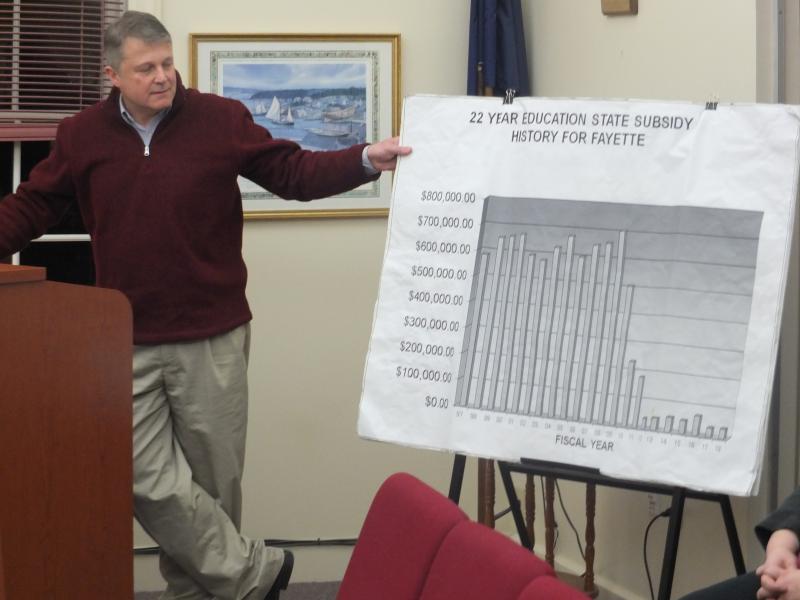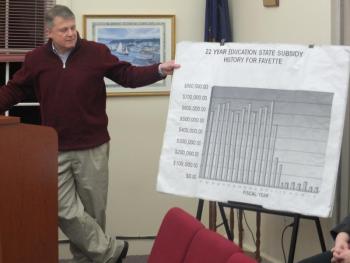Boothbay supports other minimum receivers seeking more education funding
Boothbay is considering endorsing an effort a Kennebec County town is spearheading to increase state subsidies to communities the state Department of Education calls “minimum receivers.”
Three selectmen gave Fayette Town Manager Mark Robinson their verbal support Nov. 26 to join a statewide grassroots effort for “Raising the Floor” on the state’s Essential Program and Services funding formula. For minimum receiver school systems like Fayette and the Community School District of Boothbay and Boothbay Harbor, the EPS formula only pays a large percentage of their previous year’s special education costs, Robinson explained in a presentation.
Fayette is a kindergarten through grade five school with 75 students and received $55,000 in state education subsidies for the current school year. Funding the remaining $2,056,000 was left to local taxpayers.
“Our taxpayers were responsible for the remaining $2 million. So the select board gave me a special duty this year,” he said. “I’m traveling across the state armed with a poster showing our past 22-year history with state subsidy payments seeking support from other minimum receivers for a more equitable system for our students,” he said.
The CSD is a pre-kindergarten through grade 12 school with 447 students. The district receives a 10 percent state subsidy which leaves local taxpayers responsible for the remaining $10 mi1llion school budget. Without more state money, Robinson believes minimum receivers, like Fayette and the CSD, will be responsible for paying an even greater percentage of future educational costs.
And he predicts it wouldn’t be long before communities reached a breaking point. “It will come to a point when the taxpayers finally say enough and close the schools, and I don’t think that’s good for anybody,” he said.
Despite concerns about how the formula treats minimum receivers, Robinson doesn’t support wholesale changes in the EPS formula. He pointed toward the 2013 Picus report commissioned by the Department of Education as evidence supporting his conclusion. The department hired Picus & Associates, a California-based educational consulting firm, in 2013 to evaluate the EPS formula.
“The report said the formula overall did what it was intended, and I agree with that, but it also noted there was an exception and it didn’t work for communities like ours. And to my knowledge, the state never acted on any of the report’s findings.”
Robinson said the state’s lack of action on school funding resulted in Fayette selectmen seeking an alternative. In August 2017, the board consulted with the Portland law firm Preti Flaherty in devising a plan for increasing state funding for minimum receivers. Several options were considered and a new plan emerged which would serve approximately 116 minimum receivers statewide without infringing upon current EPS payments to less affluent communities.
The collaboration resulted in a plan which raises minimum subsidy EPS payments to 15 percent. Minimum receivers like Boothbay, which receives a 10 percent subsidy, or Fayette, which receives 7 percent, would see an increase to 15 percent.
“We came up with ‘Raise the Floor’ which is something that would help our communities without impacting our brothers and sisters (non-minimum receiving districts),” Robinson said. “This won’t be easy. It will take time and we need your help to bring this plan to the Legislature’s attention. I’m not here trying to sell you anything. I’m just asking for your help,” he said.
By “Raising the Floor,” Robinson reported his group’s research would require an additional $22 million in the state’s $7.1 billion biennial budget. The proposal would net $307,000 more for the CSD and $206,000 more for Fayette. The grassroots effort plans on lobbying newly elected legislators in January. Robinson also wants Boothbay leaders to contact newly elected State Representative Holly Stover, a Boothbay Democrat and State Senator Dana Dow, a Waldoboro Republican, who will serve as the chamber’s minority leader in the next session.
The grassroots effort is also seeking financial support for lobbying. This year, the group raised $35,000 of its $50,000 fundraising goal. The group is using a formula heavily weighted in student population figures for community donations. The group is requesting $5 per student so the cost for Boothbay, Boothbay Harbor and the CSD would be around $2,300. “I know this is a big ask,” he said. “But in January, there will be a new governor and new Legislature receiving requests from many different groups all battling for state funds and it’s important they hear our voices.”
In promoting the “Raise the Floor” proposal, Robinson told selectmen the lobbyist must answer one important question: Why should we give more money to communities like Lamoine and Hancock (both Hancock County towns)?
Robinson has an answer. “These towns’ property values like yours (Boothbay) are high, but their per capita income is low. The EPS formula doesn’t account for that. In Fayette, we have a lot of lakes and streams, so we understand why this is so important to minimum receivers across the state,” he said.
All three Boothbay selectmen in attendance — Steve Lewis, Dale Harmon and Mike Tomacelli — were supportive. The board will consider officially supporting “Raise the Floor” at the next board meeting. The selectmen also plan on meeting with Boothbay Harbor and CSD officials about contributing to the lobbying effort.
Event Date
Address
United States























